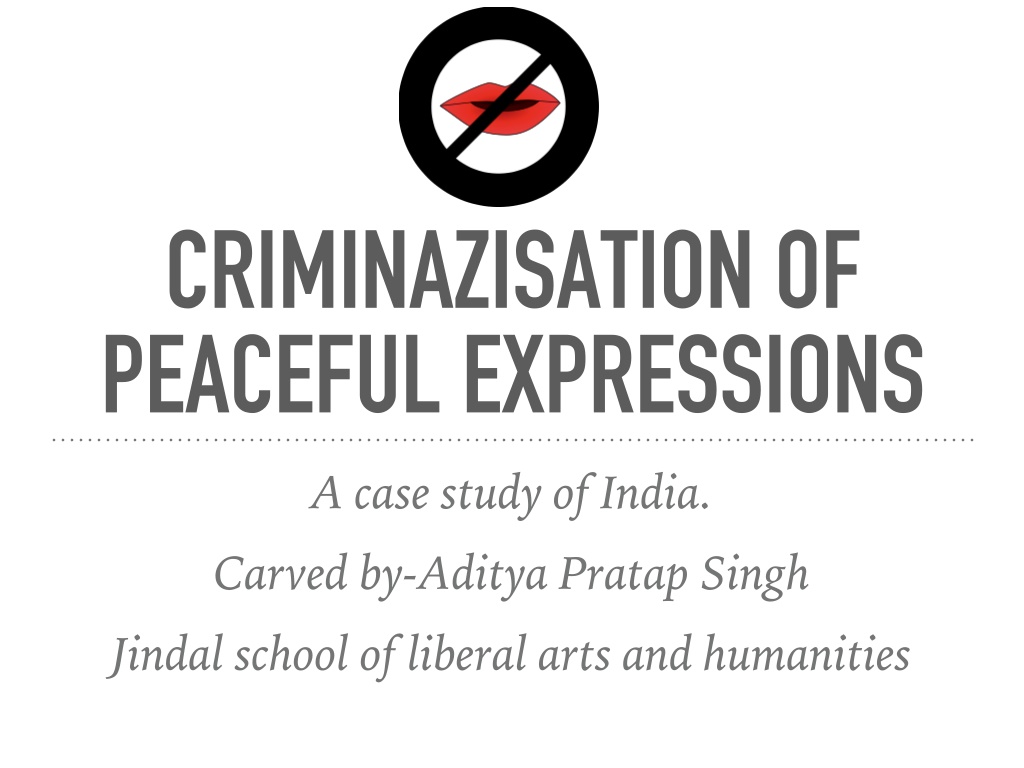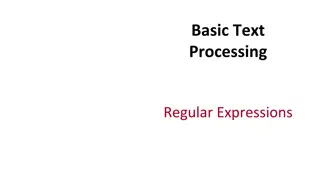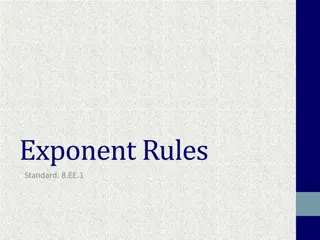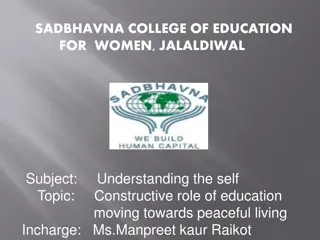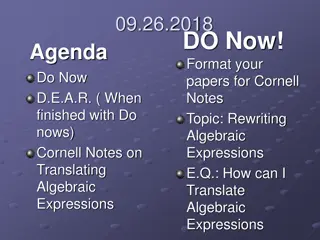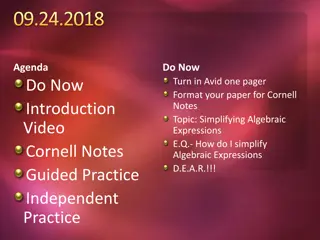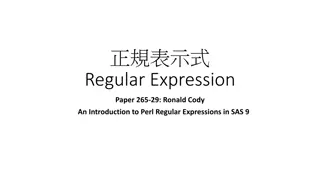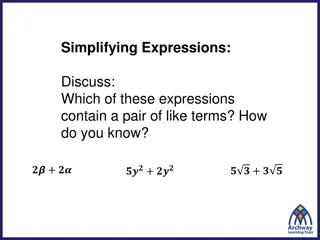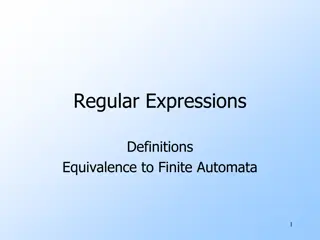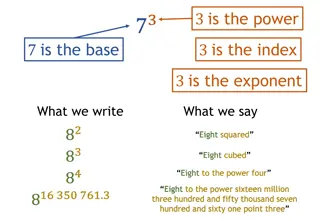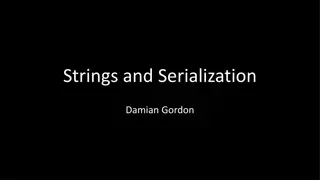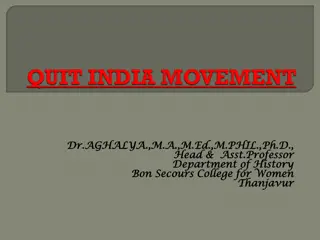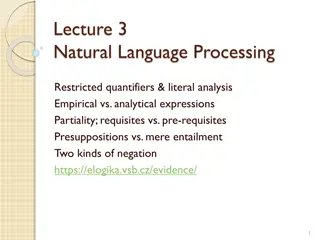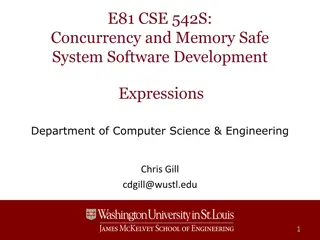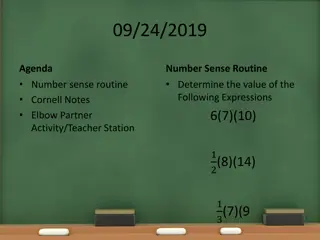Criminazisation of Peaceful Expressions: A Case Study of India
Indian governments use laws like sedition and defamation to stifle dissent, despite PM Modi's call for free speech. The sedition law, a colonial-era relic, is used against activists and critics, with vague language allowing misuse. Famous cases, including the arrest of Kanhaiya Kumar, highlight the misuse of such laws. Legal precedents show that sedition charges should apply only in cases of incitement to violence.
Download Presentation

Please find below an Image/Link to download the presentation.
The content on the website is provided AS IS for your information and personal use only. It may not be sold, licensed, or shared on other websites without obtaining consent from the author. Download presentation by click this link. If you encounter any issues during the download, it is possible that the publisher has removed the file from their server.
E N D
Presentation Transcript
CRIMINAZISATION OF PEACEFUL EXPRESSIONS A case study of India. Carved by-Aditya Pratap Singh Jindal school of liberal arts and humanities
INTRODUCTION Our democracy will not sustain if we can t guarantee freedom of speech and expression, Prime Minister Narendra Modi said in June 2014, after a month in office. Indeed, free speech is so ingrained that Amartya Sen s 2005 book, The Argumentative Indian, remains as relevant today as ever. Yet Indian governments at both the national and state level do not always share these values, passing laws and taking harsh actions to criminalise peaceful expression. The government uses draconian laws such as the sedition provisions of the penal code, the criminal defamation law, and laws dealing with hate speech to silence dissent. These laws are vaguely worded, overly broad, and prone to misuse, and have been repeatedly used for political purposes against critics at the national and state level.
SEDITION LAW The sedition law, section 124A of the Indian Penal Code (IPC), is a colonial-era law that was once used against political leaders seeking independence from British rule. Unfortunately, it is still often used against dissenters, human rights activists, and those critical of the government. The law allows a maximum punishment of life in prison. It prohibits any signs, visible representations, or words, spoken or written, that can cause hatred or contempt, or excite or attempt to excite disaffection toward the government. This language is vague and over broad and violates India s obligations under international law, which prohibit restrictions on freedom of expression on national security grounds unless they are strictly construed, and necessary and proportionate to address a legitimate threat. India s Supreme Court has imposed limits on the use of the sedition law, making incitement to violence a necessary element, but police continue to file sedition charges even in cases where this requirement is not met.
SOME FAMOUS CASES OF SEDITION. In February 2016, police in Delhi arrested Kanhaiya Kumar, a student union leader at the Jawaharlal Nehru University, after members of the student wing of the ruling Bharatiya Janata Party (BJP) accused him of making anti-national speeches during a meeting organised on campus. The public meeting was held on February 9 to protest the 2013 hanging of Mohammad Afzal Guru, who was convicted for his role in a December 2001 attack on parliament that killed nine people. Afzal Guru s execution remains a matter of intense debate in the country. The Delhi police admitted to the court that Kumar had not been seen raising any anti-national slogans in the video footage available. The Delhi High Court granted him bail in March. Five more students were booked in the case; two, Umar Khalid and Anirban Bhattacharya, were also arrested and later released on bail.
PRECEDENTS FOR SEDITION In Kedar Nath Singh s Case, 5 judges of the Supreme Court a Constitution bench made it clear that allegedly seditious speech and expression may be punished only if the speech is an incitement to violence , or public disorder . Subsequent cases have further clarified the meaning of this phrase. In Indra Das v State of Assam and Arup Bhuyan v State of Assam, the Supreme Court unambiguously stated that only speech that amounts to incitement to imminent lawless action can be criminalised. In Shreya Singhal v Union of India, the famous 66A judgment, the Supreme Court drew a clear distinction between advocacy and incitement , stating that only the latter could be punished.
A LETTER TO THE HOME MINISTER FROM AMNESTY INTERNATIONAL Dear Home Minister, Section 124A of the Indian Penal Code, which defines the offence of sedition , is a colonial-era relic. It was enacted by the British to repress India s independence struggle. Mahatma Gandhi, who was imprisoned under the law, called it the prince among the political sections of the Indian Penal Code designed to suppress the liberty of the citizen . Courts have ruled that any expression must involve incitement to imminent violence for it to amount to sedition. But the law has been used again and again to arrest journalists, activists and human rights defenders simply for expressing critical views. The sedition law is excessively vague and broad, making it an easy tool to stifle dissent and debate. There is no good way to apply Section 124A. It does not comply with international human rights law. It violates the right to freedom of expression under the Indian Constitution. And it goes against India s tradition of tolerance. I urge you to repeal this abusive law. Yours sincerely, Amnesty International India supporters who take injustice personally.
CRIMINAL DEFAMATION Human Rights Watch believes that criminal defamation laws should be abolished, as criminal penalties infringe on peaceful expression and are always disproportionate punishments for repetitional harm. Criminal defamation laws are open to easy abuse, resulting in very harsh consequences, including imprisonment. As the repeal of criminal defamation laws in an increasing number of countries shows, such laws are not necessary for the purpose of protecting reputations. Criminal defamation laws should be abolished because they can lead to very harsh consequences, including imprisonment, Human Rights Watch said, a view endorsed by the United Nations Human Rights Committee and various special rapporteurs on human rights.
The frequent use of criminal defamation charges by the Tamil Nadu state government, led by Chief Minister Jayalalithaa, against journalists, media outlets, and rival politicians shows how laws can be used to silence critics of the government. The Tamil Nadu government reportedly filed nearly 200 cases of criminal defamation between 2011 and 2016. For instance, the Tamil-language magazines Ananda Vikatan and Junior Vikatan, both published by the Vikatan group, face charges in 34 criminal defamation cases, including for a series of articles assessing the performance of each cabinet minister.
INTERNATIONAL LAW AND INDIA In 1979, India ratified the International Covenant on Civil and Political Rights, which sets forth internationally recognised standards for the protection of freedom of expression. Yet, as detailed here, a series of Indian legal provisions, some of them used by prosecutors and litigants on a regular basis, continue to restrict speech in ways inconsistent with that covenant. In some cases, the Indian Supreme Court has properly issued rulings narrowing the scope of the laws, but they continued to be misused, making clear that the laws themselves need to be amended or repealed if India is to comply with its international obligations.
Importantly, the consequences of violations go beyond improper limits on speech. As former UN Special Rapporteur on freedom of expression Frank La Rue has stated, freedom of expression is not only a fundamental right but also an enabler of other rights, including economic, social and cultural rights, such as the right to education and the right to take part in cultural life and to enjoy the benefits of scientific progress and its applications, as well as civil and political rights, such as the rights to freedom of association and assembly . [A]arbitrary use of criminal law to sanction legitimate expression constitutes one of the gravest forms of restriction to the right, as it not only creates a chilling effect, but also leads to other human rights violations.
RECOMMENDATIONS FOR THE GOVERNMENT Develop a clear plan and timetable for the repeal or amendment of laws that criminalise peaceful expression. Drop all pending charges and investigations against those who are facing prosecution for the exercise of their right to freedom of expression and assembly. Train the police to ensure inappropriate cases are not filed with courts. Train judges on peaceful expression standards so that they dismiss cases that infringe on protected speech.
